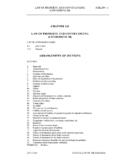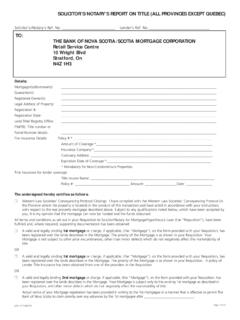Transcription of LAND ACT, 2020 (ACT 1036)
1 LAND ACT, 2020 (ACT 1036) JUNE, 2021On 23rd December, 2020, the Land Act, 2020 (Act 1036) (the Act ) became effective in Ghana. The Act revises and consolidates previous enactments1 on land into a single law, and is the manifestation of reforms in the land sector that began with the implementation of the 1999 National Land Policy (NLP). The Act s stated object is to ensure sustainable land administration and management, and effective and efficient land tenure and it seeks to achieve this by, inter alia, establishing a broad-based framework for registering land rights and interests, a customary land rights framework and enhancing transparency and accountability in land governance provisions in the Act include: Transaction-Based Registration and Recording of Land RightsThe Act provides three systems for the recording and registration of rights and interests in land, to wit.
2 - Recording of Customary Interests and Rights by the Customary Land Secretariats (CLS); Registration of Instruments relating to Land; and Registration of Title, Interests and Rights to Land. Under the Act, registrable interests include Allodial Title; Common Law Freehold; Customary Law Freehold; Usufructuary Interest; Leasehold Interest; and Customary Tenancy and an interest in a condominium, an apartment or flat2 whilst registrable rights include Mortgages; Easements; Restrictive Covenants; Profit a Prendre; Powers of Attorney; Contractual Licences; and User Rights under a Certificate of Allocation.
3 To speed up the registration process and to de-congest the land courts, alternative dispute resolution has been introduced as the dispute resolution mechanism in matters concerning land or interests in land registration districts. This is designed to replace the non-functional title adjudication committees established by the Land Title Registration Act, 1986 ( 152) Customary Land Rights FrameworkThe Act makes significant improvements in setting out the legal framework for customary land rights. For example, chiefs, tendanas, clan heads, family heads, or other authorities in charge of the management of stool, skin, family or clan lands are now designated as fiduciaries with a duty to discharge their functionsfor the benefit of the stool, skin, family or clan.
4 As fiduciaries, the law requires them to make decisions affecting land in a transparent, open, fair and impartial manner. To encourage compliance, any such fiduciary who fails to comply with his or her fiduciary duties will be sanctioned by way of a fine and /or imprisonment3. In addition, the Act provides a new legal basis for the Customary Land Secretariats (CLS), and assigns to them the role of taking an inventory of customary rights, interests and transactions within their jurisdiction. Hitherto, legislation on customary land administration was confined to only stool and skin lands. To create a unitary form of customary land administration, clan and family lands have now been included in the customary land provisions.
5 Electronic ConveyancingElectronic conveyancing has been introduced by the Act in an effort to speed up the process of conveyancing. The Lands Commission is mandated to establish a land information system equipped withthe requisite information technology infrastructure, to facilitate the electronic transfer, creation and registration of interests in land. Amongst others, the requirements for a valid electronic conveyance include the following: (i) the electronic conveyance is to be made by a qualified legal practitioner who has been granted access to the information system by the Lands Commission; (ii) the electronic conveyance must record the time and date on which the conveyance takes effect; and (iii) the electronic signature of each person who authenticates the conveyance and each electronic signature on the conveyance must be certified in accordance with the Electronic Transactions Act, 2008 (Act 772).
6 Defending Spousal RightsPursuant to Article 22 of the 1992 Constitution of Ghana, the Act makes significant improvements in safeguarding spousal land rights in the context of land acquired during instance, spouses names must be included when registering land acquired for valuable consideration during marriage unless a contrary intention is expressed, and there isa presumption that any land acquired during marriage by one spouse is co-owned by both spouses (even if only one spouse s name is registered). The Act also requires spousal consent for transactions involving land acquired for valuable consideration during a marriage.
7 Per section 47 of the Act, in the absence of a written agreement to the contrary, a spouse shall not, in respect of land, right or interest in land acquired for valuable consideration during marriage:a. sell, exchange, transfer, mortgage or lease the land, right or interest in the land; enter into a contract for the sale, exchange, transfer, mortgage or lease of the land, right or interest in the land; give away the land, right or interest in the land inter vivos; or enter into any other transaction in relation to the land, right or interest in the landwithout the written consent of the other spouse, which consent shall not be unreasonably provision is in harmony with Ghana s Sustainable Development Goal (SDG) Number 5 which aims to undertake reforms to give women equal rights to economic resources, as well as access to ownership and control over land and other forms of property , financial services, inheritance and natural resources in accordance with national laws.
8 Enhancing Transparency, Accountability and Accessibility in Land Governance InstitutionsAs part of efforts to ensure sustainable land administration and management, the Act provides for specific penalties for offences by land sector officials and other persons. The Act criminalizes a number of actions including falsification of land records; fraudulent issuance, entry, erasure or alteration of documents issued by the Lands Commission; fraudulent mutilation or obliteration of any land register or other document kept in the Lands Commission; and fraudulent deletion or alteration of the electronic records of the Lands Commission by a public officer or any other person.
9 CONCLUSIONIn view of Ghana s economic development and increase in population, the new Act provides a critical opportunity to address both historic and current challenges and issues in the land sector. Novel reforms, such as electronic conveyancing, are Ghana s way of keeping up with a fast-paced world and is expected to improve the efficiency of recording and registration of land transactions. The new Act repeals the following enactments; Land Development (Protection of Purchasers) Act, 1960; Farm Lands (Protection) Act, 1962; Land Registry Act, 1962; Administration of Lands Act; 1962; State Lands Act, 1962; Section 11 of the Survey Act, 1962; Lands (Miscellaneous Provisions) Act, 1963; Public Conveyancing Act, 1965; Rent Stabilization (Amendment) Act 1966; Rent Stabilization Act, (Repeal) Decree 1966; Conveyancing Act, 1973; Public Lands (Protection) Act, 1974 and the Land Title Registration Act, 1986.
10 Such an interest is to be registered in accordance with Regulations made under the Act. As at the date hereof, it is noted that no regulations have been enacted in this regard. The fine is between 5,000 to 10,000 penalty units (currently, between GHS 60,000 and GHS 120,000 on the basis that one penalty unit equals GHS12).* JLD & MB Legal Consultancy is a top-tier corporate and commercial law rm with extensive experience advising global and local clients on some of Ghana s highest pro le transactions. We provide innovative and solution-oriented advisory services across several practice groups and have received international recognition for our lawyers and our work in a number of sectors including Oil, Gas and Petroleum, Energy and Natural Resources, Banking and Finance, Capital Markets and Mergers and : JLD & MB LEGAL CONSULTANCY TEL: +233 (0)302 This publication is for information purposes only and is not intended to constitute legal DGYLFH ,I \RX UHTXLUH IXUWKHU LQIRUPDWLRQ RQ DQ\ PDWWHU GLVFXVVHG LQ WKLV DUWLFOH NLQGO\ FRQWDFW WKH UP



